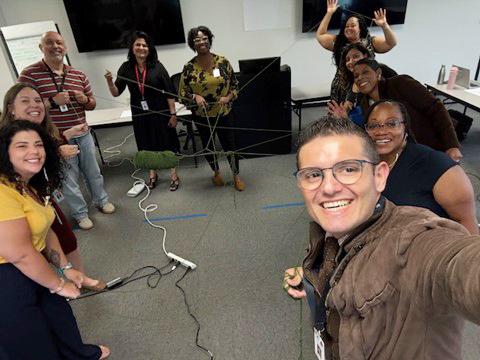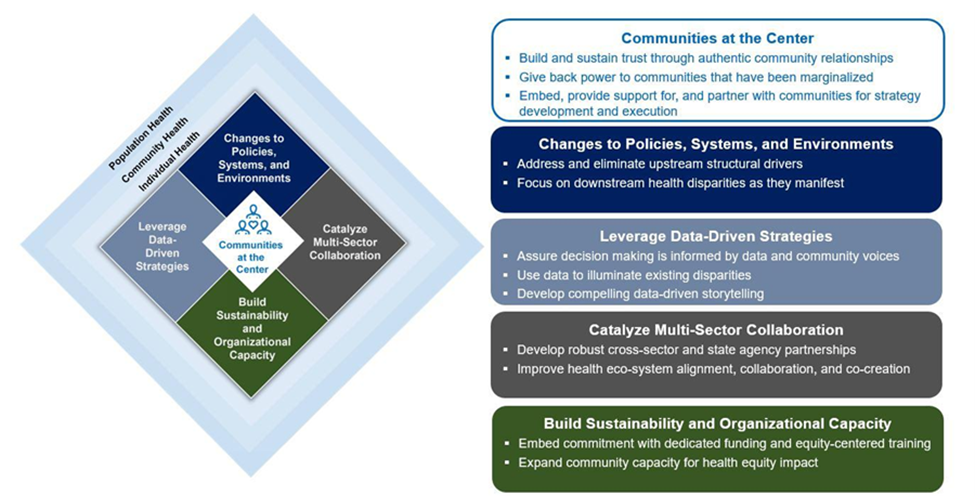Office of Minority Health and Health Disparities Priorities

Purpose
This page shares key priorities the Office of Minority Health and Health Disparities (OMHHD) has set to address many of the needs to reduce the burden of disparities.
OMHHD works to eliminate health disparities for all individuals and keep communities healthy, safe and connected to needed resources and services. OMHHD serves with a partnership-driven approach.
OMHHD is committed to working for every person to have the opportunity to live a healthy life, to ensure an effective health equity strategy across the Department of Health and Human Services and the state of North Carolina, and to bring together partners from various sectors to gain collective expertise and perspectives, informing next steps and creating a shared commitment to reducing health inequities.
Background
Reducing disparities means making sure everyone has a fair chance to achieve their best health. Achieving this requires collaboration across sectors to address the social drivers of health—the conditions in which people live, work, learn, and play. These include access to good jobs, quality education, affordable and high-quality health care, expanded digital access, reliable transportation, digital access, safe housing and healthy environments.
OMHHD uses data, evidence-based interventions, evaluation, policy, communication, partnerships and workforce development to build healthier communities and improve outcomes for historically underserved populations.
Our Framework: Communities At The Center
In 2022, the Office of Minority Health and Health Disparities (OMHHD) built a strategic framework to guide how we build healthier communities across North Carolina. At the center are communities, whose voices and experiences shape our work. Surrounding this are the main priorities that drive our efforts: At the heart of the framework are communities, whose voices, experiences and leadership drive everything we do. Surrounding this center are the core areas of our strategy:

- Changes to Policies, Systems, and Environments – Addressing the root causes of poor health and focusing on solutions where the needs are greatest.
- Leverage Data-Driven Strategies – Using both data and community voices to guide decisions and shine a light on health differences.
- Catalyze Multi-Sector Collaboration – Bringing together partners from health, government, and community organizations to align efforts and co-create solutions.
- Build Sustainability and Organizational Capacity – Ensuring lasting impact with dedicated resources, training, and support for community-led health improvements.
This framework also reflects the principles of the National Culturally and Linguistically Appropriate Services (CLAS) by promoting communication and services that are respectful, responsive, and easy to understand. The five areas of the framework are not one-time steps. Instead, they are ongoing efforts that must be revisited to remain responsive to changing community needs. By keeping communities at the center and following CLAS principles, OMHHD fosters trust, builds stronger relationships and supports healthier futures for all North Carolinians.
Core Goals
- Integrate disparities-focused strategies and attention to social drivers of health into NCDHHS programs, policies, data systems and funding processes.
- Mobilize and engage partners to implement approaches that reduce health gaps and address the social and economic conditions that influence health.
- Develop tools, systems and workforce capacity to transform infrastructure and better serve North Carolina communities.
Priorities
Each NCDHHS division and office will develop and implement action plans that align with an agency-wide disparities reduction strategy. These action plans should:
- Focus on solutions that reduce health gaps, improve population health, and strengthen health outcomes.
- Support the implementation of policies and strategies across DHHS that address social drivers of health and expand opportunity for well-being in historically underserved communities.
- Advancing the science and practice of reducing health disparities through data-driven and evidence-based approaches.
- Strengthening collaboration with local and state partners to expand opportunities for good health across North Carolina.
Call for Action
The Office of Minority Health and Health Disparities (OMHHD) has developed practical plans and models to support programs and projects that improve health across our state. We invite individuals, teams and organizations—both within and beyond NCDHHS—to place shared well-being at the center of their work.
Our community resources, created in partnership with local leaders and organizations, are designed to reduce obstacles to health. They offer a flexible foundation for building strong teams, launching impactful initiatives and guiding efforts that reflect the needs and strengths of people across North Carolina.
Together, we can create lasting change and healthier outcomes for everyone.
